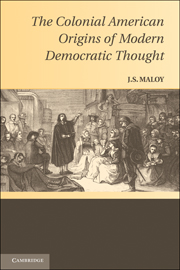Crossref Citations
This Book has been
cited by the following publications. This list is generated based on data provided by Crossref.
Maloy, J. S.
2011.
The First Machiavellian Moment in America.
American Journal of Political Science,
Vol. 55,
Issue. 2,
p.
450.
2012.
Cotton Mather als Aufklärer.
p.
269.
Eisenach, Eldon J.
2014.
The Encyclopedia of Political Thought.
p.
73.
LENOWITZ, JEFFREY A.
2015.
“A Trust That Cannot Be Delegated”: The Invention of Ratification Referenda.
American Political Science Review,
Vol. 109,
Issue. 4,
p.
803.
Cuttica, Cesare
2019.
Popularity in Early Modern England (ca. 1580–1642): Looking Again atThingandConcept.
Journal of British Studies,
Vol. 58,
Issue. 1,
p.
1.
Maloy, J. S.
2019.
Smarter Ballots.
p.
23.
Rahman, K.Sabeel
and
Russon Gilman, Hollie
2019.
Civic Power.
Fitzmaurice, Andrew
2022.
The early modern corporation as nursery of democratic thought: the case of the Virginia Company and Thomas Hobbes.
History of European Ideas,
Vol. 48,
Issue. 4,
p.
309.
Bejan, Teresa M.
2022.
What Was the Point of Equality?.
American Journal of Political Science,
Vol. 66,
Issue. 3,
p.
604.
Škop, Martin
2022.
Salus populi jako korektiv rozhodování v pandemických situacích: past, nebo cíl?.
Časopis pro právní vědu a praxi,
Vol. 30,
Issue. 4,
Maloy, J S
2022.
Climate Change, Energy Transition, and Constitutional Identity.
International Studies Review,
Vol. 25,
Issue. 1,
Ciepley, David
2023.
Democracy and the Corporation: The Long View.
Annual Review of Political Science,
Vol. 26,
Issue. 1,
p.
489.
Krause, Skadi Siiri
2024.
Tocqueville-Handbuch.
p.
343.
Krause, Skadi Siiri
2024.
Tocqueville-Handbuch.
p.
245.





